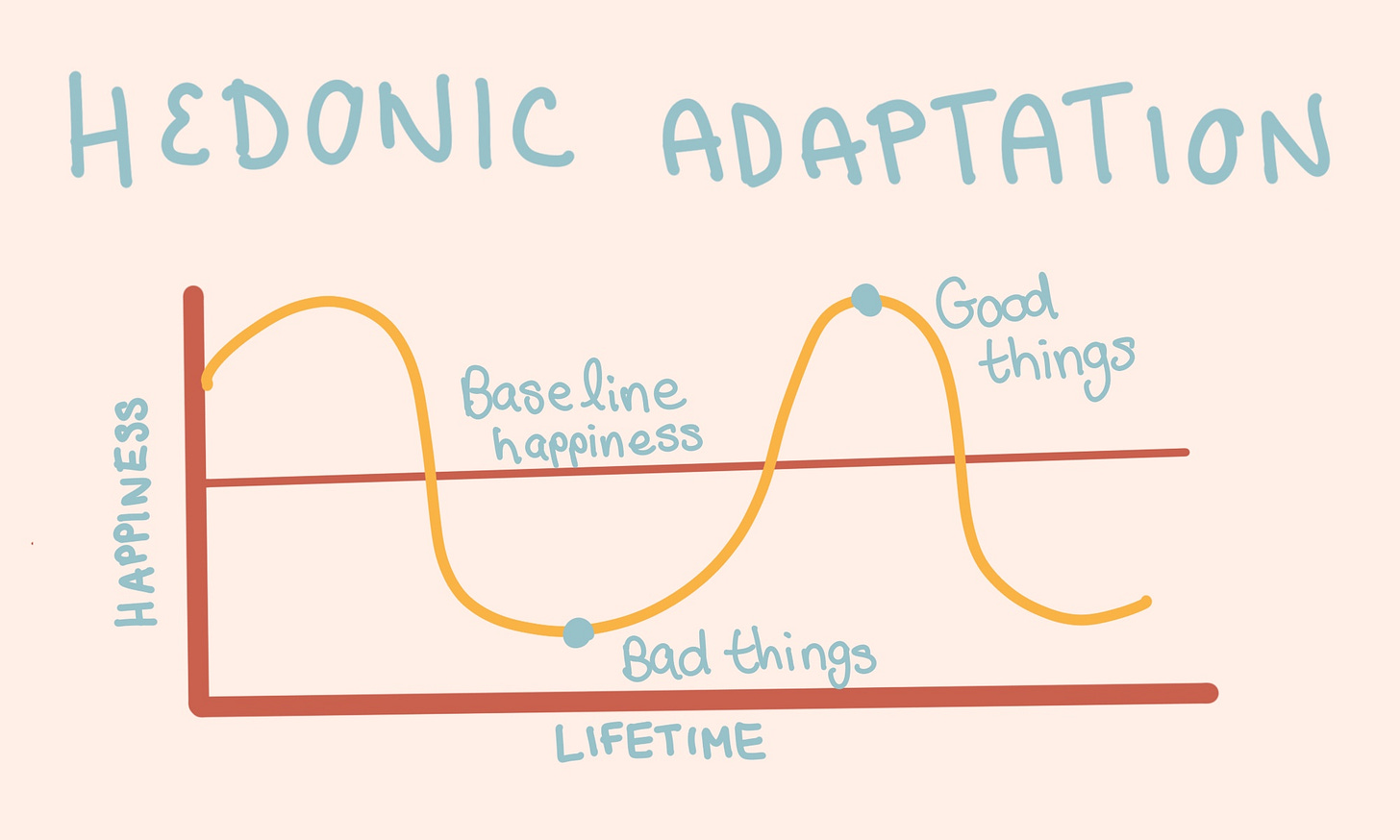Reading time: 4 mins
There’s no way you made it through the past weekend without encountering three million and sixty four Black Friday advertisements. The onslaught is everywhere (except, strangely, at Next, where I could really use a discount). We’re inundated with promises that these hair vitamins, this linen duvet cover, those noise-cancelling headphones, will change our lives. And with the 30, 40, 50% discount, who would say no?
Time for a psychology reality-check.
Hedonic adaptation - also described as the hedonic treadmill - is the psychological term for the idea that our happiness will always return to a stable baseline, despite positive or negative events. While our happiness is affected in the moment, it will return to a set point over time, as we get used to the impacts of an event.
It’s a fancy term for a common lived experience - we have all experienced that over time we take things for granted that we previously couldn’t wait for. And we learn to live with something that was once earth-shattering.
This is, of course, something the Bible had proclaimed long before the term ‘hedonic adaptation’ was coined. The book of Ecclesiastes informs us in no uncertain measures that pleasures are fleeting and everything1 is meaningless. Throughout the Bible, saints discover that our circumstances cannot be relied on for our happiness. Paul describes contentment not as receiving fifty packages from the Black Friday sales, but as total reliance on God.
I know what it is to be in need, and I know what it is to have plenty. I have learned the secret of being content in any and every situation, whether well fed or hungry, whether living in plenty or in want. I can do all this through him who gives me strength.
(Philippians 4:12-13, NIV)
As an eternal optimist, I refuse to accept that my happiness will just stay the same regardless of what happens in my life. Sure, it’s reassuring to know that we can adapt to difficult circumstances, but I would like to believe that there are things - like marriage, children and maybe a new mascara - that will make my life happier.
There are several solutions to slowing the impact of hedonic adaptation:2
Recognise the difference between gratifications and pleasures.
Gratifications are activities that engage us so that we don’t notice time passing - hobbies like pottery, dancing, writing. They usually take a bit more effort to get into, but we come out feeling refreshed.
Pleasures are quick-hits, like going to a nice coffee shop, calling a friend, or watching a favourite TV show.
Making time for gratifications in our week will serve us more than stuffing it full of pleasures.
Include variety in pleasures.
Pleasures are good - we all benefit from quick-hit happiness throughout the day. But we will appreciate them more if we rotate them. That Black Friday package will make me happy but I’ll become numb to the effects of incessant online shopping.Slow down and appreciate the good things.
Gratitude is one of the best ways to support well-being.3 When we are actively thankful for something, it stops us from taking it for granted.
As I’ve pointed out above, the Bible includes warnings against materialism, and encourages us to give thanks in all circumstances. But it also gives us so much more.
More than life hacks for appreciating your new bike for longer, the Bible offers a deeper-rooted joy than anything this world can offer: God himself. Eternal pleasures/gratifications/soul-satisfying happiness are found in him.
You make known to me the path of life; you will fill me with joy in your presence, with eternal pleasures at your right hand.
(Psalm 16:11, NIV)
On the Christian journey, we shift our eyes from the temporal pleasures to the eternal satisfaction of life with Christ.
So we fix our eyes not on what is seen, but on what is unseen, since what is seen is temporary, but what is unseen is eternal.
(2 Corinthians 4:18, NIV)
Black Friday specials and Christmas gifts are not bad. But they are temporal pleasures on this path to a far, far greater satisfaction.
Please feel free to reply to this email with thoughts, comments or questions. I’d love to hear from you!
Apart from God.
Sheldon and Lyubomirsky, 2012. The Challenge of Staying Happier: Testing the Hedonic Adaptation Prevention Model. Personality and Social Psychology Bulletin, 38, 5. https://journals.sagepub.com/doi/abs/10.1177/0146167212436400
Wood, Froh and Geraghty, 2010. Gratitude and well-being: A review and theoretical integration. Clinical Psychology Review, 30, 7. https://www.sciencedirect.com/science/article/abs/pii/S0272735810000450







